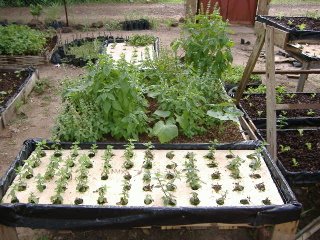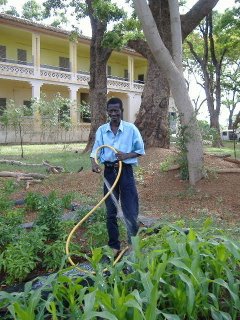

July 3 About garden work:
Every morning, unless it has rained the night before or looks very much like it will rain before noon, the garden must be watered. Seck usually does this himself. The watering takes a long long time because the water pressure is low, there is only one hose, and this hose is accident prone. It is yellow, and in many places it looks like a peeled banana with the skin hanging off, revealing the black tube underneath. The hose is in many pieces, some of which have a slightly wider diameter than others so the pieces may be plugged in to one another. Chunks of hose lay all over the garden so that one can choose to lengthen the hose in one corner of the garden, and then by reconnecting segments one can reach another corner without ever having had to move the hose very far. If Seck bends the hose slightly, or if in using his thumb to direct the stream of water he puts his thumb too deep into the hose, creating too much pressure, or if the hose just feels like it, a joint will come apart, and Sek will be left staring helplessly at his dry hose, calling to me to find the culprit. As soon as I plug the hose back together, it comes apart at another joint. When I run over to this other joint, one of the scraps of fabric tied to the hose to cover a hole comes loose and a geyser shoots into the air. I try to lay the hose so that joints are either in a garden bed or up hill from some flowers so that escaping water goes to good use.
While Seck is watering I might have him fill the watering can for me so that I can gently give the carrots a drink. I might take cuttings from flowers to plant elsewhere in the garden. If a pepinaire sack has more than one sprout coming up, I will find sacks in which there is no plant or there is a dead plant, and I will give each sprout its own sack. I have transplanted lettuce sprouts into table beds, put young eggplant plants into new beds, crumbled cowpatties, dug beds, mixed dirt with crumbled cow paties, laid plastic in the ground and secured it with rocks to create improved beds, planted seeds, carted dirt, peanut shells, and cowpatties around the garden in the wheelbarrow, applied insecticides, discovered I do not have the will to crush centipeeds, heard Seck bash a snake to death, and, of course, spent lots and lots of time weeding. Come the end of the rainy season we will not have to weed so much, but with the frequent downpoors, every spot of dirt between beds is quick to sprout greenery, and if we do not keep the weeds to a minumum, we will soon have more snakes.
In addition to the usual gardeny work, I have also had the pleasure of chasing goats out of the garden and trying to strengthen our fence against their attacks. I spent one afternoon searching for thorny branches and weaving them into a barrior which I wedged into the fence so that any goat wanting to hop from the cement step and over the fence will get a belly full of gashes. I felt like pond scum when I caught myself admiring my handiwork. I hope the goats will look before they try to leap back into the garden.
As Jenny did before me, I am supposed to manage the finances of the garden. When I arrived the garden had 1,400 cfa and owed roughly 25,000 cfa. The money is owed not to a person, but to an account. Six months ago money was donated to allow someone from Kolda to go to Dakar bring back gardening supplies. If all was fair and honest, the gardeners in Kolda would have paid for these supplies as they used them, putting just enough money in the account to send someone back up to Dakar to buy more tools, seeds, and such. The supplies were kept in a storage room to which Seck and the others had easy access. The storage room is now nearly empty, and the account is as well. Had Jenny not kept close track of his takings there would be no knowing how much we owe. She thinks none of the Senegalese people involved ever saw this as much more than a way to get some things for free, so there will probably be no one coming to the garden to complain about the lack of payment. Still, the debt indicates that the garden is not sustainable as is. When the supplies are gone, if there is no further donation, the garden will be in trouble. This June the garden made 5025 cfa through vegetable and flower sales, 1255 cfa of which goes to the garden. The rest belongs to Seck and his family.I recently collected seeds from basil plants. This was my first time gathering seeds. It adds a sense of eternity to gardening. One of my chief delights each morning is visiting my watermelons. When I tried growing watermelons in Palo Alto I had many flowers and nary a fruit. Now I have three healthy little watermelons that swell more and more each night. I used to have five, but a few days ago I discovered worms eating two of them. Seck’s daughter, Nafi, looked up, concerned, when, upon reaching my watermelon patch, instead of giving my usually gasp of delight I let out an agonized moan. One aspect of the garden that makes no sense to me is the fish heads. Everywhere there are fish heads. I guess some cats drag fish bodies into the garden by night, eat the choicer parts, and scatter the fish heads so they can watch and laugh as I fall over trying to avoid stepping on them. Or perhaps it is one of Seck’s enemies trying to perform a fish-head based black-magic.A few times a week I go to the men sitting outside the agriculture office, shake their hands, and chat with them a bit.
And, thankfully, I have on occasion led visitors through the garden, showing off the improved beds, hammocks, water tables, and other interesting features.
I am posting this on line on Thursday, and today Seck and I spent a long time squatting by one of the carrot beds. A few weeks ago I seeded a second the bed for a second time, but still very few carrots have sprouted. Seck thinks this might be because of a slightly hard layer of dirt and mold that is developing like a green skin on top of the plot. Using small twigs we made incisions and painstakingly peeled back the skin.


